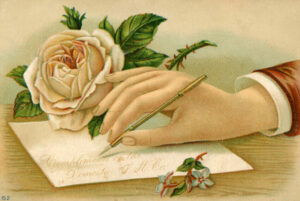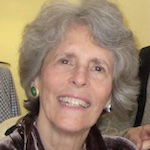
Remember letters? Ones that came in the mail with stamps and occasional foreign postmarks? Remember that moment of anticipation before opening the letter? Remember the thrill of a love letter and the thwarted desire to be in immediate contact?
Of course, now in the age of e-mail and texting we can make almost instant contact and become impatient if not answered at once. Forget the patience and time required to find the right words before mailing. Alas, the “art” of letter writing seems a part of the past.
As it happens, I have more than my share of the past. I’m the last of a family who never threw away a piece of paper, much less a letter. Between my mother and myself, I have thirty notebooks filled with correspondence dating back to the late 1800s. These letters tell the tales of many generations, their mores, daily lives, their beliefs, hopes and aspirations.
They begin with my great grandfather, Robert Poore Valentine, writing courtship letters to Miss Ida Payne of “Linden Hill,” Fluvanna County, Virginia. Mr. Valentine, a busy wood, coal and lime dealer, lived in Charlottesville, some sixteen miles away. Written in faded pen, the first letter is dated April 15, 1872. It starts “My Dear Friend, I am determined that I will not sleep until I write to you . . .” He then apologizes for not having come to visit on Sunday but fears it would not have been proper behavior. “ . . . My conscience said that such a trip on Sunday would not be for my spiritual good as I look upon going to church in the county more as a frolic than going to the house of God…” He concludes, “I miss your sweet and charming face. . . . I certainly wish you would come up even if it is not but for a day . . . ” He signed his letter, “I am your true and sincere friend, RPV.”
Their polite and restrained letters go back and forth with growing protestations of loyalty and affection. In August 1873, when Ida has gone to Danville (about 135 miles) for some months to visit cousins, she wrote Robert: “ . . . although we are separated, we should consider it a blessing to reveal our every thoughts to each other. . . . Don’t you know I love you when I tell you so, and it may add to your happiness for me to repeat that you occupy the highest position in my heart. It comes from my heart as I write it.”
Robert and Ida were married November 6, 1873. They would have four children together. One of those children, Bessie, was my grandmother who married Albert Walker, a traveling journalist. He wrote Robert Valentine asking for Bessie’s hand. “It has been the custom in Christian lands from time immemorial for suitors in quest of the hand of the lady they adore to seek the consent of the father before the last rites of the compact are enacted. Therefore knowing this to be my sacred duty, I hereby ask the permission to marry your daughter, Bessie whom I long loved, and who, in turn, assures me of her affection and devotion. . . .”
Albert and Bessie were often separated for Albert to produce special newspaper editions in various towns along the East Coast. They kept in touch with letters. In one from Cambridge, Md. he ended saying, “I miss you more today than ever. . . . The room is so gloomy and the only decoration in it is your portrait, the likeness of my dear sweet little Bessie, the country girl who was foolish enough to marry a lobster. . . .” Bessie, visiting her parents, ever practical and constant, wrote him later about money concerns. ‘I wish I could say something to comfort you. . . . I’ll see you in a few days and we will talk it all over. We still have one or two things that we can fall back on, so things could be worse but it’s hard to think so when you are all tired out and you have done the best you could. Keep cool and don’t worry. You will be making $200 a week soon. . . . ”
In 1909 their daughter, Virginia, was born. She sometimes traveled with her parents, staying in resident boarding houses. At age four, Virginia was in the hospital for typhoid. Albert wrote his concern to his father-in-law, Robert Valentine. “When I left the hospital just now they had Virginia on a bed of ice and wet ice towels were over her little body. Poor little Virginia, what a difference now in her little, weak and thin body on that bed so silent and still, and the red cheeked little girl that would run down the board walk with arms outstretched to meet me, calling Daddy, Daddy when I would arrive at the cottage station from my day’s work. . . . ”
Virginia grew up and married Everard Meade in 1931. They moved to Manhattan and lived on a dream and a dime. My father landed a job in advertising which took him to Hollywood where he worked on popular radio shows. When World War II broke out, he felt duty-bound to volunteer for the service. He was sent to Hawaii as a Navy Intelligence officer whose work was kept secret. My mother, meanwhile, stayed home dealing with daily demands and raising her young daughter. She counted her rations and gathered with women friends missing their husbands. My parents wrote each other every day. In May 1944, my mother wrote, “There must be a better word than ‘miss’ to tell you how lost I am without you . . . if I sound fed up from time to time who wouldn’t be after getting used to a feller like you then have to turn him over to the ‘govment.’ I love you! I love you! I love you!”
On June 6, 1944, my father wrote: ” . . .Every man here felt a great uplift in spirit when the news (invasion of Europe) came. From long habit I refused to let myself think in terms of what a victory over there would mean, but the minute the first boy set foot on European soil, the feet of every American overseas moved a small fraction nearer his home. . . . I am thankful to be alive and my only aim is to get this over as soon as we can. I love you, Ebbie.”
When the time came, I too wrote lots of letters—to family and friends, male and female. I loved getting letters and, like my mother, saved many. As the years passed, fewer and fewer were the correspondents. I became an avid e-mailer and sent only the rare letter. Now many are condolences.
Through all the decades, however, one faithful friend continued to send me letters in the mail. Suzanne never owned a computer and prefers to write in long hand on beautifully chosen note paper. Her sight is now poor and her hand unsteady, but her welcome letters still arrive. I look forward to these gentle reminders of the thought they took and another, slower paced era. I answer, enjoying the feel of the pen in my hand. I’m grateful for her letters along with those of my family, a documented, intimate legacy of time well spent and an inspiration for years to come.

Share this post with your friends.

